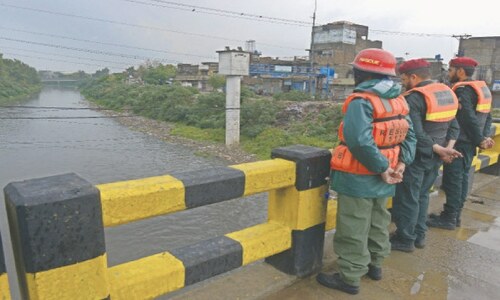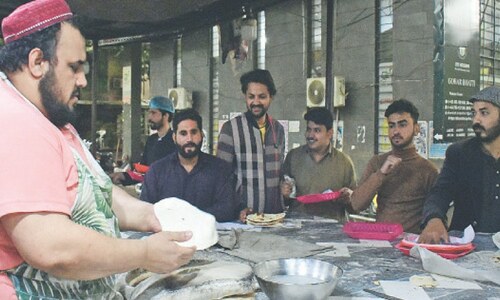POLITICIANS are notorious for having big ambitions and even bigger egos, for more often than not they rubbish whatever idea and scheme their rival preceding them had introduced in the name of public good.
Each one must have his own brand of solution for the same good and with the same purpose - to earn name and fame for himself. Indeed the trait is not exclusive to politicians. People at the top of any power structure wish to bask in the glory of what “I did”.
For instance, during the past 10 years, Islamabad had four police chiefs and each of them preferred to implement his own ideas about community policing rather than working and perfecting the one his predecessor had introduced.
So was the case with their junior officers, with any powers, when the objective remained the same - to bridge the trust gap between public and police by improving policing.
However only a few of the schemes launched in the effort since 2000 have survived, including the Community Policing Centre and Detective Foot Constable introduced in 2011.
One cannot be sure of the survival chances of the Modern Reporting Section added to some police stations just last month.
Even where money was not involved, ideas and projects were abandoned for no other reason than it was the brainchild of someone else. The result was nothing got done.
Some officers in the ranks blamed the trend on the Police Rules. They are practically confined to the beat system and have left innovation and fresh ideas to individual officers.
Community policing centre and detective foot constable In March 2011, the then IGP Wajid Ali Khan Durrani introduced a policing system assigning a policeman two or three streets to keep watch on criminals and criminal activity. Called the Bit Officer, he has to collect and record details of everyone and everything under his watch - residents, worship places, shops, market, parking areas.
Two sub-sectors are given under the command of an assistant sub-inspector, while a sub-inspector is in-charge of a sector and responsible to supervise the ASI, head constables and constables.
Equipment and vehicles were provided to them but building offices for them brought police in confrontation with the Capital Development Authority for refusing land and the police hauled up some CDA officials.
Detective foot constables (DFC) were introduced a month later to collect intelligence and keep an eye on suspicious activities.
Twenty-six inspectors of capital police were equally divided among the 13 police stations and appointed as Additional Station House Officers for the purpose.
Gender crime unit and ladies complaints units
IG Durrani's predecessor, Kalim Imam and his team established the Gender Crime Unit and Ladies Complaint Units at police stations in 2010 to deal with women victim of violence and encourage women to seek police assistance without fear.
The project was funded by Germany and jointly implemented by the National Police Bureau and the German technical cooperation unit, GTZ.
The Gender Crime Unit was designed to gather data on gender related crimes and send it to the National Police Bureau for analysis and research.
In January 2011, the capital police and GTZ Gender Responsive Policing (GRP) Project agreed to create Ladies Complaint Units (LCUs) for taking prompt action in cases of violence against women.
Women police staff was posted in the units to facilitate women complainants especially victims of violence and provide them assistance without a fear of being intimated.
The agreement terminated in April 2012.
Women police stations
Islamabad’s lone Women Police Station was inaugurated by late Prime Minister Benazir Bhutto on January 25, 1994. Today it exists in name only.
Like many other social schemes, this good initiative was launched just to carry out an “order” - without proper ground work. Neither any legislation nor a Standard Operating System was framed regarding the jurisdiction and work of the police stations.
Worse, no serious efforts were made to induct women in the police department. The first batch of female constables was recruited only in 1995.
The police station was supposed to provide the persecuted women in our conservative, male-dominated society a safe way to report their grievances to police.
But the good scheme fell flat as no female police personnel were trained for the professional tasks, not even for the first women police station.
A policewoman of assistant sub-inspector rank was given shoulder promotion so that a woman could head the symbolic women police station. Under law, only an SI can investigate heinous crimes.
Since no female officer of that rank existed, all the cases filed with the Islamabad women police station were investigated by male police officers, defeating the very purpose of setting up women police station.
At one stage, in 2007, the police hierarchy even ordered the station to stop registering cases. It restarted doing that in 2008 but with male officers investigating the cases it registered.
Human right officers
In January 2005, the then police high-ups introduced Human Rights Officers (HROs) in the capital police to protect the rights of accused and persons picked for investigation, besides preventing illegal detention and torture of detainees and provide them medical facilities.
The HROs were selected from the police officers who had served as such with United Nations Missions abroad. After three years, the uniformed HROs were replaced by civilian HROs by the then Senior Superintendent of Police Sayed Kalim Imam on the former's failure to deliver results.
But his successor removed the civilian HROs on taking over the office in March 2008.
Public conciliatory committee reconciliation, peace committees
In 2000, the then SSP Nasir Khan Durrani introduced Public Conciliatory Committee (PCC), renamed later as Reconciliation and Peace Committees, as part of restorative justice to resolve petty disputes at the police station level without involving the police resources for trivial matters.
But political interference doomed them as the ruling parties packed the committees with their own activists. Police officers also misused them by referring only those cases they wanted to delay.
In 2008, the committees were disbanded.
Modern reporting section
This is the latest attempt at improving policing, introduced in February 2013, the reigning Inspector General of Police Bani Amin Khan, introduced Modern Reporting Section in the system, with the help of US government's International Criminal Investigation Training Assistance Programme and the International Narcotics and Law Enforcement Agency.
Such sections have started working in three city police stations, including Shalimar and Aabpara, to end the humiliation and long delays that citizens usually suffered in registering their complaints with the result that many crimes went unreported.
Police sources said a Modern Reporting Section costs up to Rs2.2 million to set and many are planned. The idea may be good but who can be sure it would last when a reporting room is not considered part of policing nor mentioned in the Police Rules. The next IGP of Islamabad can fold them up like the Gender Crime Unit and Ladies Complaint Units were.
















































Dear visitor, the comments section is undergoing an overhaul and will return soon.